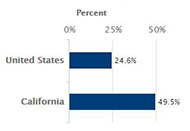|
|
|||||||||||||||||
|
|||||||||||||||||
|
|||||||||||||||||
|
|||||||||||||||||
|
Helpful Links Immigrant-Inclusive State and Local Policies Move Ahead in 2014-15 (PDF), National Immigration Law Center The Educational, Psychological, and Social Impact of Discrimination on the Immigrant Child, Migration Policy Institute Asian Pacific Islander (API) Population Report: In Our Own Words, California Dept. of Public Health, Office Of Health Equity Urban Institute: Immigrants and Immigration Migration Policy Institute: Data Hub
|
|||||||||||||||||
|
|
|||||||||||||||||
|
Kidsdata.org is a program of the Lucile Packard Foundation of Children's Health, which uses data to promote the health and well being of children This email was sent by: %%Member_Busname%% To view this email as a web page, click here. |




